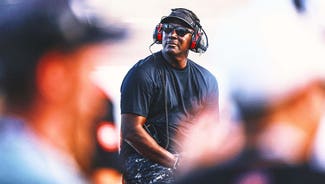
NASCAR community mourns death of Dick Trickle
Mark Martin received a piece of advice very early in his career from Dick Trickle that he's never forgotten.
''He was the one that told me, and this is kind of corny, but it isn't when you're 18 or 19 years old - he told me `In order to finish first, first you must finish,''' Martin said. ''That stuck with me always.''
The NASCAR garage was full of Trickle stories on Friday, a day after the 71-year-old racer died of an apparent self-inflicted gunshot wound. An old-school driver with an odd name, and a guy who earned an almost cult-like following among fans, Trickle was mostly remembered Friday for his role as a mentor to many drivers who went on to have far greater success in NASCAR than Trickle ever achieved.
A short-track star from Wisconsin Rapids, Wis., Trickle was believed to have won up to 1,000 races while inspiring hundreds of racers throughout the Midwest. Among them was Hall of Famer Rusty Wallace, a St. Louis native who toured the same Midwest circuit and raced Trickle down to the wire for the 1983 ASA championship.
''When I was short-track racing, I would call him every Monday morning and he would always help me with race setups and stuff,'' Wallace said. ''He and I had such a good time telling little stories, but he was the guy that taught me almost everything in the (Midwestern) American Speed Association. And he was the guy that I battled right to the end for my 1983 ASA championship. I barely beat the guy that taught me everything.''
Martin said he, Wallace and the late Alan Kulwicki, a Wisconsin native, owed their success to Trickle.
''We wouldn't have been the racers that we were when we got here had we not come under his influence,'' Martin said. ''For the influence that he had on us, and the etiquette and the way he raced - he raced us real hard on the race track, but off the race track, he was very free with parts or advice. He gave freely. Really, really good dude. I'm confused and broken-hearted about what happened.''
Audio released Friday by the Lincoln County (N.C.) emergency dispatch center revealed a calm Trickle stating his location in the Forest Lawn Cemetery, and telling the dispatcher where to find a `93 pickup truck.
''There's going to be a dead body. A suicide,'' said the caller, who never identified himself as Trickle.
''Are you there?'' asked the dispatcher.
''I'm the one,'' he responded.
The call ended as the dispatcher said she was sending help.
Trickle's brother, Chuck, told The Las Vegas Review-Journal that his brother had been having constant chest pains, and his obituary posted on the website for the Warlick Funeral Home in Lincolnton said doctors could not find the source of ''severe chronic pain.''
''His family as well as all those who knew him, find his death very hard to accept, and though we will hurt from losing him for some time, he's no longer suffering and we take comfort knowing he's with his very special angel,'' said a statement from the family, referring to the Trickle's oldest granddaughter, Nicole Bowman, who was killed in a car accident nearly 12 years ago.
''Dick's passion in life was his racing. He touched many lives throughout his career, provided memories for many that will last a lifetime. Many thought when he retired he would continue as a car owner, but he was driver at heart, he wanted to be behind the wheel and be in control of his destiny,'' the statement continued. ''We believe he felt himself no longer able to be behind that wheel of life or be the man he only knew how to be because of the pain and suffering.''
Trickle is survived by his wife, Darlene, three children and three grandchildren.
Trickle didn't move full time to NASCAR until 1989, when he was 47 years old. He made 303 career starts in the Cup Series, and although he never won a Cup race, he scored two wins in the second-tier series.
His death shocked 2003 NASCAR champion Matt Kenseth, a Wisconsin native who last spoke to Trickle last July after Kenseth won a Late Model race at Slinger Speedway.
''He kind of peeked in the trailer there afterwards - of course he asked if we had any beer in there - and man, we sat in there for two hours,'' Kenseth said. ''That was the last time I saw him. We talked for two hours and he always had a lot of - he had a unique way of looking at things, he had a ton of common sense and he was really smart and always had a really funny way of putting things. Ninety percent of the stuff he told me through all the years I raced with him always proved to be right.
''I'm still in shock. I don't really get it. I don't really know what all went on there. That's about it.''

